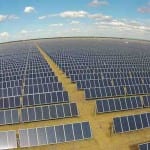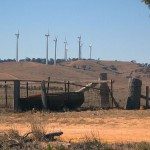Feed aggregator
Saudi Arabian tech company eyes production plant for its carbon-negative concrete
Euro Markets: Midday Update
Asset manager support for environmental, social issues has “catastrophically crashed”, warns investor pressure group
The fate of nuclear power at stake in Taiwan election
World’s biggest blue carbon project overcredited, but good on additionality -rating agency
South Korea urged to make major cuts in CO2 allocation in next ETS phase
Australian billionaire commits to a massive 14GW of new wind power
‘Astounding’ ocean temperatures in 2023 intensified extreme weather, data shows
Record levels of heat were absorbed last year by Earth’s seas, which have been warming year-on-year for the past decade
“Astounding” ocean temperatures in 2023 supercharged “freak” weather around the world as the climate crisis continued to intensify, new data has revealed.
The oceans absorb 90% of the heat trapped by the carbon emissions from the burning of fossil fuels, making it the clearest indicator of global heating. Record levels of heat were taken up by the oceans in 2023, scientists said, and the data showed that for the past decade the oceans have been hotter every year than the year before.
Continue reading...Labour will be taking a risk sticking by its £28bn green energy plan. It should do it anyway | Larry Elliott
True, the Tories will accuse Keir Starmer of being spendthrift, but it’s better for the party to fight an election on its own terms
It’s official: 2023 was the hottest year since records began and by some distance. The Earth is now 1.48C warmer than it was before the dawn of the industrial age and rapidly approaching the target limit of 1.5C set by the international community in Paris in 2015.
The movers and shakers who will pitch up in Davos to attend next week’s World Economic Forum (WEF) are worried – as well they might be. The WEF’s global risks survey is unequivocal: in a highly dangerous world, the threat posed by the climate emergency is the one that gives most cause for concern in the long term.
Larry Elliott is the Guardian’s economics editor
Continue reading...Installation of rooftop solar panels in UK hits 12-year high in 2023
Industry data shows almost 190,000 installed last year as well as record number of heat pump installations
The number of households and businesses installing rooftop solar panels has reached its highest level in 12 years, while heat pump installations climbed to record highs in 2023, according to the industry’s official standards body.
The figures showed almost 190,000 rooftop solar installations were carried out last year, the highest level since the government slashed its subsidy scheme in late 2011.
Continue reading...More work needed to triple renewable power by decade’s end -IEA
World’s renewable energy capacity grew at record pace in 2023
IEA report says 50% growth last year keeps hope of achieving Cop28 climate target of tripling clean energy capacity
Global renewable energy capacity grew by the fastest pace recorded in the last 20 years in 2023, which could put the world within reach of meeting a key climate target by the end of the decade, according to the International Energy Agency (IEA).
The world’s renewable energy grew by 50% last year to 510 gigawatts (GW) in 2023, the 22nd year in a row that renewable capacity additions set a new record, according to figures from the IEA.
Continue reading...Tasmanian garden wins prize for world’s ugliest lawn
Winner says people can save water, help animals and free themselves from the tyranny of lawnmowing
It is not so much a lawn as a moonscape: pitted craters dug by bandicoots, exhausted tufts of withered yellow grass plucked by wallabies and pitiful plants shrivelled brown under the Australian sunshine.
But Kathleen Murray is the proud winner of the first World’s Ugliest Lawn competition after the Swedish contest to encourage water-saving, environmentally-friendly gardening went global.
Continue reading...Key milestone for WA’s biggest battery, with all storage units installed
 WA government says all of the containerised batteries are in place for the state's biggest battery, the 200MW four-hour (800MWh) Kwinana 2 project.
WA government says all of the containerised batteries are in place for the state's biggest battery, the 200MW four-hour (800MWh) Kwinana 2 project.
The post Key milestone for WA’s biggest battery, with all storage units installed appeared first on RenewEconomy.
CP Daily: Wednesday January 10, 2024
Big solar records round out the year for NSW and Queensland
 Latest Rystad Energy data reveals new big solar output records for December. Meanwhile, the wind blew strongest in the West.
Latest Rystad Energy data reveals new big solar output records for December. Meanwhile, the wind blew strongest in the West.
The post Big solar records round out the year for NSW and Queensland appeared first on RenewEconomy.
California Governor Newsom’s climate budget cuts show no sign of slowing in 2024
Happy birthday Challicum Hills: The wind farm that launched an industry
 As Victoria's Challicum Hills wind farm turns 20, it's worth reflecting on what a pioneering and pivotal project it was for renewable energy in Australia.
As Victoria's Challicum Hills wind farm turns 20, it's worth reflecting on what a pioneering and pivotal project it was for renewable energy in Australia.
The post Happy birthday Challicum Hills: The wind farm that launched an industry appeared first on RenewEconomy.
Mysterious plants and fungi named new to science
Forrest turns sod on NSW biggest wind farm, firms 14GW plans with major turbine deal
 Squadron Energy breaks ground on Uungula Wind Farm and announces multi-billion dollar turbine supply deal to underpin giga-scale project pipeline.
Squadron Energy breaks ground on Uungula Wind Farm and announces multi-billion dollar turbine supply deal to underpin giga-scale project pipeline.
The post Forrest turns sod on NSW biggest wind farm, firms 14GW plans with major turbine deal appeared first on RenewEconomy.



